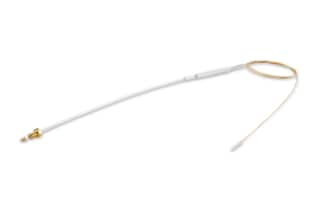
|
Chemistry |
C18 |
|
Separation Mode |
Reversed Phase |
|
Particle Substrate |
Silica |
|
pH Range Min |
2 pH |
|
pH Range Max |
8 pH |
|
Temperature Limits |
45 C |
|
Maximum Pressure |
15000 psi (1034 Bar) |
|
Endcapped |
Yes |
|
Bonding Technology |
T3 |
|
Silanol Activity |
Medium |
|
Particle Shape |
Spherical |
|
Particle Size |
1.8 µm |
|
Endfitting Type |
Valco(male)|360um Open |
|
Pore Size |
100 Å |
|
Format |
Column |
|
BTO Flag |
true |
|
Surface Area |
230 |
|
System |
Nano/Micro |
|
Particle Technology |
HSS |
|
USP Classification |
L1 |
|
Inner Diameter |
100 µm |
|
Length |
100 mm |
|
Carbon Load |
11 % |
|
UNSPSC |
41115711 |
|
Brand |
ACQUITY UPLC M-Class |
|
Product Type |
Columns |
|
Units per Package |
1 pk |

ACQUITY UPLC M-Class HSS T3 Column, 100Å, 1.8 µm, 100 µm X 100 mm, 1/pk
The ACQUITY UPLC M-Class Columns are optimized for nano- to microscale liquid chromatographic separation, with the best sensitivity, resolution, and repeatability for biomarker discovery and protein identification and characterization. The lab equipment is very good at handling pressure changes during injection and consequently has a long life span. It's critical to make suitable connections to avoid peak tailing and poor efficiency in order to obtain optimal performance.
The ACQUITY UPLC M-Class HSS T3 Column improves the retention of polar chemicals and metabolites in reversed-phase liquid chromatography. Analytes can more easily access the material's pore structure due to this lab equipment. Without the use of ion-pair reagents, this results in balanced retention of polar and hydrophobic compounds.
Use the ACQUITY UPLC M-Class HSS T3 Column to examine a variety of diverse and complex formulation compositions using a single chromatographic technique.
The Waters HSS (High Strength Silica) particle technology, which was developed to endure UPLC pressures utilizing a mechanically tolerant, silica-based material, is also used in the ACQUITY UPLC M-Class HSS T3 Column. The Waters HSS (High Strength Silica) particle technology employs a novel synthetic technique that considerably improves silica's mechanical stability while keeping pore volumes comparable to those found in HPLC silica-based materials. When compared to hybrid particle technology, this leads to higher retentivity. In addition, the HSS is an excellent substrate for producing stationary phases with different selectivity.
The ACQUITY UPLC M-Class HSS T3 Column is trifunctionally bound to the HSS particle substrate, allowing for good peak forms and pH stability. In comparison to hybrid-based C18 columns, this is available in addition to greater retention. You can not only meet the challenges of the laboratory with the ACQUITY UPLC M-Class HSS T3 Column's remarkable characteristics, but you can also be confident that your lab will be more productive and successful in achieving your objectives.
By perusing our website and becoming familiar with our whole product range, you will be able to build a full lab equipment portfolio. Waters has been at the forefront of cutting-edge research for decades, bringing innovative products to market and satisfying all of your analytical demands.
We recommend that you also explore the MassPREP Enolase Digestion Standard. Yeast Enolase (SwissProt P00924) is digested with sequencing grade trypsin to produce Waters MassPREPTM Enolase digestion standards. There is no undigested standard protein, trypsin, or other hydrophilic components in the resultant protein digest. Each batch of protein digestion meets stringent quality control standards.
What pH Range Is Offered By The ACQUITY UPLC M-Class HSS T3 Column?
The lab equipment listed here offers 2-8 pH.